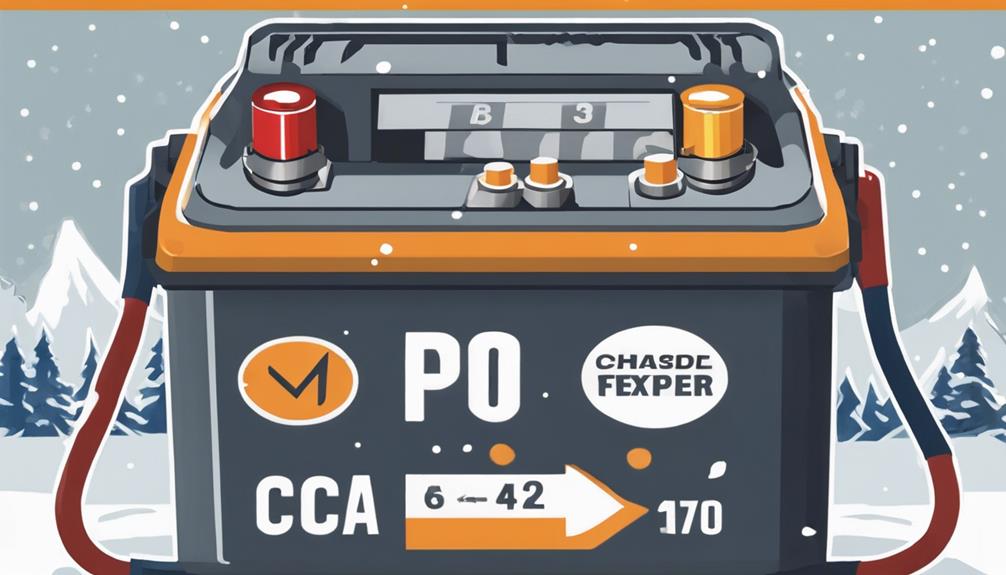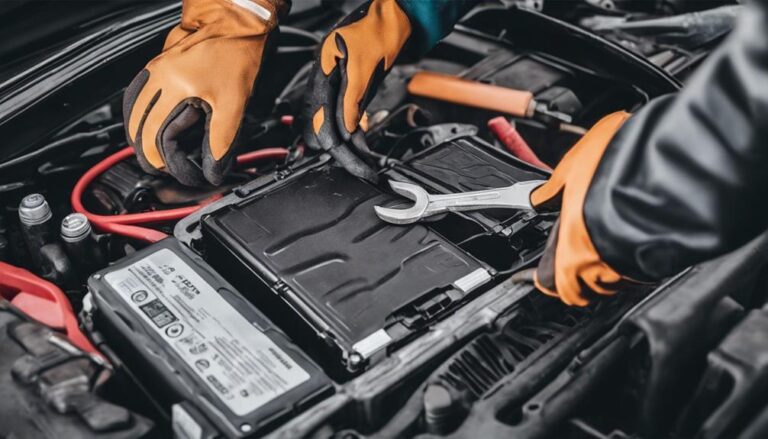Selecting the Best Car Battery for Replacement
Imagine your car stranded on a frosty morning, the engine struggling to start. The key to avoiding this scenario lies in selecting the best car battery for replacement.
With a vast array of options available, it's crucial to navigate through the technical specifications to find the perfect match for your vehicle. From battery size and CCA to reserve capacity and brand reliability, each factor plays a significant role in ensuring your car runs smoothly.
Stay tuned to discover the essential considerations for choosing the ideal car battery that will keep you on the move without any hiccups.
Key Takeaways
- Choose correct size and type for optimal performance
- Consider reputable brands like Optima, Odyssey, or Bosch
- Pay attention to installation tips and terminal type
- Follow manufacturer's recommendations for smooth replacement
Factors to Consider When Choosing
When selecting a car battery, it's crucial to carefully consider the correct size and type recommended for your vehicle to ensure optimal performance and compatibility. Start by comparing reputable battery brands like Optima, Odyssey, or Bosch. These brands are known for their quality and performance, providing you with a reliable choice for your vehicle's power needs.
During the selection process, also pay attention to installation tips. Ensure that the terminal type matches your vehicle's configuration (side posts or top posts) for a proper fit and secure installation. Following the manufacturer's recommendations for installation will help prevent any compatibility issues and ensure a smooth replacement process.
Understanding Battery Group Sizes
Understanding Battery Group Sizes is essential for selecting the correct car battery that fits your vehicle's specific requirements and ensures optimal performance. Battery group sizes determine the physical dimensions and terminal locations of the battery, influencing compatibility and installation requirements. Each vehicle has a designated group size based on make, model, and engine type. Choosing the right group size ensures a secure fit and proper electrical connections. Here is a table outlining the importance of battery group sizes:
| Aspect | Description | Importance |
|---|---|---|
| Terminal Location | Determines where the battery terminals are located for proper connection | Ensures correct electrical contact |
| Compatibility | Matching the group size to your vehicle's requirements ensures a proper fit | Prevents loose or incorrect installations |
| Physical Dimensions | Varying sizes and shapes to fit different vehicles | Ensures the battery fits securely |
| Installation Requirements | Group size indicates the battery's shape and fit in the vehicle | Facilitates proper installation |
| Vehicle Specificity | Each vehicle requires a specific group size for optimal performance | Prevents compatibility issues |
Importance of Cold Cranking Amps (CCA)

Measuring a car battery's ability to start the engine in cold temperatures, Cold Cranking Amps (CCA) plays a critical role in ensuring reliable engine starts. Battery performance hinges on the CCA rating, especially in harsh weather conditions. Higher CCA values are essential for larger engines or areas with cold climates.
Diesel engines, in particular, demand batteries with elevated CCA ratings to facilitate efficient starting during cold snaps. The variation in CCA values among battery models underscores their significance in initiating engine operations. To guarantee optimal performance, it's imperative to match the CCA rating with the specific requirements of your vehicle.
Checking and selecting a battery with the appropriate CCA rating is fundamental in ensuring that your engine starts reliably, regardless of the weather conditions. Therefore, when considering a car battery replacement, always prioritize the CCA rating to meet the demands of your vehicle and the prevailing weather impact.
Battery Reserve Capacity and Amp Hour
The Battery Reserve Capacity and Amp Hour metrics are crucial factors to consider when selecting the right car battery for your vehicle's power requirements. Battery Reserve Capacity indicates how long the battery can power accessories without the engine running. A higher Reserve Capacity translates to more backup power for the electronics in your vehicle. This metric is measured in minutes and varies depending on the battery's design and size.
On the other hand, Amp Hour (Ah) capacity signifies the total energy the battery can store for use. Understanding both Reserve Capacity and Amp Hour is essential for choosing a battery that aligns with your vehicle's power needs.
When evaluating batteries, ensure that the voltage output matches your vehicle's requirements. Additionally, consider the battery's charging efficiency to guarantee optimal performance and longevity. By paying attention to these factors, you can select a car battery that not only meets your power demands but also enhances your vehicle's overall performance.
Matching Battery Type to Application

For optimal performance and longevity in your vehicle, selecting the appropriate battery type that matches your specific application is crucial. Battery voltage compatibility and power requirements play a significant role in determining the right battery type for your vehicle.
Consider the power demands of your vehicle, especially if it has power-hungry accessories or features. AGM batteries are well-suited for modern cars with high power requirements, offering better performance in draining and recharging cycles compared to traditional lead-acid batteries.
Climate considerations should also influence your choice; for instance, gel-cell batteries are better suited for deep discharging applications in extreme temperatures. Additionally, your charging habits can impact the battery's lifespan, so choosing a battery type that aligns with your charging routine is essential.
Frequently Asked Questions
How Do I Choose the Best Battery for My Car?
When choosing a car battery, prioritize performance, longevity, and voltage compatibility. Follow proper installation guidelines for optimal functionality. Consider battery type, CCA rating, reserve capacity, and warranty details to ensure the best fit for your vehicle.
How Do I Know Which Car Battery to Buy?
Wondering how to know which car battery to buy? Consider battery performance and compatibility concerns. Look at your vehicle's specs, like CCA rating and battery type, for a reliable replacement that fits securely.
What to Look for When Buying Replacement Battery?
When purchasing a replacement battery, focus on battery life expectancy and cold weather performance. These factors ensure long-term reliability and starting power in harsh conditions. Opt for a battery that excels in these areas to enhance your vehicle's performance.
What Is the Best Most Reliable Car Battery?
You think you've got the scoop on the best, most reliable car battery? Battery technology advancements have paved the way for top-notch longevity and performance. Consider Optima, Odyssey, or Bosch Platinum Series for superior results.
Conclusion
In conclusion, when selecting the best car battery for replacement, remember that 'measure twice, cut once.' Consider factors such as size, CCA, reserve capacity, and type to ensure optimal performance.
By paying attention to these details and performing regular maintenance, you can prolong the lifespan of your battery and avoid unexpected issues on the road.
Make a wise choice now to prevent future headaches.







